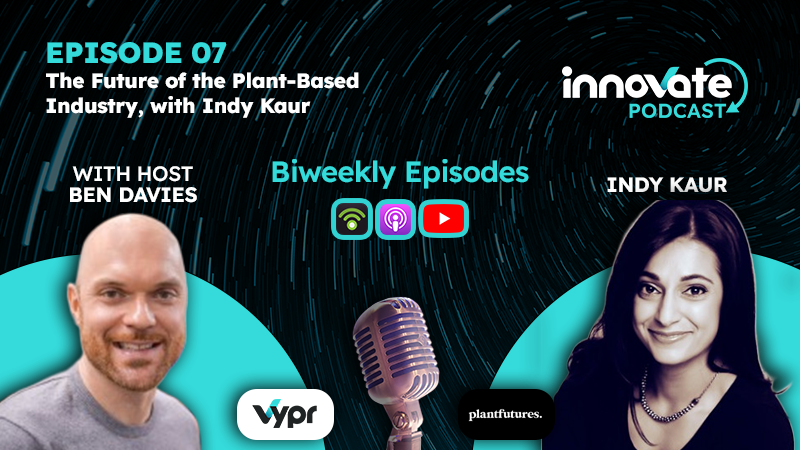The future of the plant-based industry – Innovate podcast

The Future of the Plant-Based Industry – Innovate Podcast
The Innovate Podcast is a biweekly series of discussions with CPG Innovation experts, on how to innovate with success in an ever-changing world.
In the seventh episode, our host Ben Davies, Founder of Vypr, was joined by Indy Kaur, Founder and CEO of Plant Futures, who discussed the innovative plant-based sector as it stands today, opportunities and challenges for success, and how innovation can fuel further growth.
Listen to the full episode using the links below, and don’t forget to subscribe so you never miss an episode.
Listen on Podbean, Listen on iTunes or Watch on YouTube
Read the highlights below.
Indy set up Plant Futures, a UK plant-based consultancy, to help progress the plant-based sector in the UK food industry.
The Plant-Based Sector is an Exciting Place to Be
Throughout the episode, Indy emphasised the growth of this category, identifying many opportunities such as the part the sector can play in addressing growing trends, like healthy eating and sustainability.
“One of the most dynamic and buoyant sectors of the food industry. Fundamentally it’s still a new category… we’re all still trying to figure it out in realistic terms, we know we need to get to a more sustainable food system… which makes it hugely fascinating”
But it Doesn’t Come Without its Challenges
There are of course still challenges that exist in this sector amidst all the exciting work being done, especially as it’s relatively new to the industry.
Indy emphasised the great work that has already been done to deliver great innovations, quite often at affordable prices, but identified that this has led to a lot of fixtures displaying lots of products in-stores.
Choice is always good, but when there is too much, consumers can easily become overwhelmed and put off shopping in this sector. For this reason, she mentioned the need for more curation of choices, especially to bring people in that currently don’t shop in this area.
“If you’re completely new to this category/market, you may start feeling overwhelmed, there’s a lot of choice you may not know what to choose, so we now need to reassess are those fixtures designed and curated in a way that’s going to help more people who currently don’t shop that fixture”
This also means targeted and structured innovation, tailored to consumer needs.
Innovation Will Continue to Progress the Sector
Though there is a lot of innovation being carried out in the sector, it is essential to continue to push great taste and texture in products, and to keep up with consumer needs as we mentioned above.
Indy mentioned two types of innovation in the episode, that both progress the sector in their own way:
- The more food-tech, meat-alternative development, focusing on replicating a meat-eating experience
- The ‘simpler’ culinary-style innovation, focusing on new ideas with vegetables and proteins, to make great tasting recipes
Innovation is Great, but Needs to be Carried Out Strategically
The way companies innovate is different in the plant-based industry, leading to a lot of the wins we see in the market.
Indy commented on traditional methods of innovation (namely stage-gate processes) as being the backbone of NPD across the food industry. Though providing a solid structure to the NPD process, she noted that this stage-gate process leads to a lack of agility.
“Traditional innovation, especially within larger corporations, has very much been process driven.”
“On a practical term it’s an efficient system that can help to progress innovation/NPD throughout the corporation. It does have its pitfalls… it’s not the most agile way of developing new products or new innovation. What we are seeing within plant-based, is a much more agile way of plant-based development, spearheaded by young entrepreneurs who just take on an opportunity, get it up and running into market, and then they are doing a bit more of the iterations”
To improve the way companies innovate, she believes this stage-gate process could be reviewed. After all, it’s focused on being very logical and consumers don’t tend to use a lot of logic when making supermarket purchases. She mentioned that a better way could be the combining of two worlds – the stage-gate structure with the entrepreneurial method of agility and iteration.
“I think we can bring that entrepreneurial spark and flair and bring it into the stage and gate process and just reevaluate how that changes the way we innovate. I do believe we should do more pilot trials in-market before doing national launches and distribution launches”
Companies need to ensure they’re also keeping up to date with how trends are moving to ensure their products deliver solutions for real consumer needs.
It’s Important to Know what Consumers Want
Currently, many companies are investing a lot in trying to mimic meat. This might not be a bad thing, Indy mentioned, but it’s quickly becoming a high saturated area.
Following consumer purchasing behaviours, it’s evident that innovation doesn’t have to solely be this food-tech approach to be seen as innovation or produce growth, it can also be the simpler developments, as we saw above with the culinary-style NPD – for example, using new vegetables to create a great-tasting product.
“It isn’t necessarily a bad thing but we are highly saturated within that particular space. Innovation can also be really simple… it just could be a really great piece of tofu in a new type of product, or it could be us playing around with mushrooms or new vegetables and creating new textures and flavour experiences”
“We can look at innovation as being the food tech side of innovation… getting to the closest versions of animal-based proteins or dairy, but we could also keep innovation really simple in terms of lets just talk about veg”
After all, many people are not actually looking for meat-mimics, especially vegetarians that have not eaten meat their whole life! Other groups of consumers that want to try plant-based foods also don’t want to try the meat-alternatives as they just want the more veggie options, showing there is a demand for these innovations.
“I’m hearing people who are omnivores who don’t really want to shop for plant-based alternatives – they want to eat meat when they want to eat meat, but then they want to explore new plant-based food but they just want it from plants”
So there is lots of opportunity in the plant-based sector, and it doesn’t only exist in the meat-alternative space. Companies will be able to identify these opportunities and new target audiences by looking at real consumer feedback, made possible through consumer research.
Products Should Consider Consumer Needs
Adapting products to consumer needs is also essential to keep up with a changing climate. The cost-of-living crisis is currently affecting most consumers, and except for those loyal to specific brands, most consumers are choosing products based on what’s most affordable.
“There’ll be very specific examples between consumers and certain brands… where they may not compromise, but on a general term yes we’ll probably see some shifting there in terms of loyalty and price”
There is definitely an opportunity here to develop products for this situation – as plant-based food can be a much cheaper and healthier way of eating, leaders can actively make smart decisions (using consumer research) to develop and optimise products as well as messaging.
The Future is Bright
All in all, the future is full of opportunities. To close, Ben asked Indy what she thought product innovation here will look like in the future.
She emphasised that further growth in the sector could be attained by extending focus into other groups like carnivores. So far, the sector has tended to focus on vegans, and flexitarians who are reducing their meat intake. Though she believes this will keep growing, by considering how to get more carnivores to shop in this category, this will lead to more solutions and ideas for even more growth.
Furthermore, as Indy mentioned throughout the episode, she predicts there will be more use of vegetables and other fresh ingredients to create great tasting meals, that are not just meat-alternative products.
“Meat alternatives and dairy alternative will continue on the same trajectory, not seeing that slow down in terms of innovation within those spaces. We will start seeing newness in terms of how we can capitalise on the purity of vegetables and create great food just with vegetables or natural proteins.”
—
If you want to discover more, such as how retailers and brands are optimising their plant-based offerings listen to the full podcast on-demand now. Click the links below to listen on your preferred platform.







